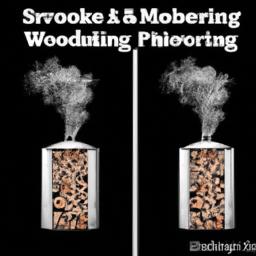Pellet Smokers vs. Wood Smokers: Decoding Your Best Choice for Savory Smoky Perfection
If you’re venturing into the world of smoking meats, the debate between pellet smokers and traditional wood smokers often comes up. Both wield passionate followings and promise mouthwatering smoky dishes, but which one aligns better with your cooking style and lifestyle? At How To Cook Gourmet, we’re diving deep to help you understand these popular smokers, comparing their flavor profiles, usability, upkeep, and costs – all to empower your next gourmet BBQ adventure.
Comprehending Flavor Profiles and Heat Management: Which Smoker Triumphs?
Determining which smoker delivers superior flavor depends largely on what you cherish in smoked foods. Wood smokers have long been celebrated for imparting a robust, authentic smoke essence reminiscent of open campfires. Their rich, complex tones come thanks to burning hardwood chunks or logs. Conversely, pellet smokers use compressed wood pellets combined with electric heating to provide steady and predictable heat, resulting in a consistent smoky flavor, though often milder in intensity.
Heat regulation is a crucial factor. Wood smokers require frequent fire tending and skill to hold a stable temperature, which can be a rewarding challenge for some. Pellet smokers excel here, featuring built-in thermostats that maintain precise temperatures with minimal intervention – think of them as a “smart,” dependable slow cooker for smoking meats.
Analyzing Key Aspects: Functionality, Upkeep, and Cost-Efficiency
| Feature | Pellet Smoker | Wood Smoker |
|---|---|---|
| Temperature Control | Automatic with digital precision | Manual adjustments, hands-on |
| Flavor Distinction | Consistent, subtle smokiness | Deep, rich, traditional smoke tones |
| Maintenance | Refilling pellets, electronic care | Cleaning ash, replacing wood fuel |
| Mobility | Compact, lighter, easier to move | Bulkier, heavier, less portable |
Cost matters, too. Wood fuel typically costs less, especially if you source your own logs, while pellets often demand higher upfront price and recurring pellet purchases. Pellet smokers can last longer through a single fuel load, which may balance the expense for frequent users. Maintenance varies as well – wood smokers need regular ash removal and more hands-on fuel management, while pellet smokers need occasional electronic upkeep and pellet restocking.
Choosing Based on Your Cooking Preferences and Lifestyle
Your daily routine and cooking habits play significant roles in this choice. For backyard pitmasters with ample space and time who enjoy the tactile experience of managing fires, wood smokers represent an authentic journey to complex smoky flavors. On the other hand, those with limited time or a penchant for convenience will appreciate pellet smokers’ “set it and forget it” technology, especially for tailgating, camping, or quick weekend cooks.
- Pellet smokers: Optimized for ease, reliability, and consistency.
- Wood smokers: Ideal for traditionalists who treasure the primal connection to fire and smoke nuances.
- Fuel and upkeep: Pellets cost more up front but reduce hands-on labor; wood smokers offer a budget-friendly, rustic experience but demand more effort.
- Size and portability: Pellet smokers typically suit mobile applications better due to lighter builds.
Frequently Asked Questions about Pellet and Wood Smokers
- 1. What fundamentally differentiates pellet smokers from wood smokers?
- Pellet smokers employ electricity to burn compressed wood pellets, offering precise temperature control. Wood smokers depend on burning natural wood logs or chunks, requiring manual fire tending but delivering a richer smoke complexity.
- 2. Which smoker is best for beginners?
- Pellet smokers are often recommended for novices due to their automated temperature controls and reduced supervision necessary. Wood smokers, while rewarding, demand experience to master temperature regulation.
- 3. Does one produce markedly better flavor than the other?
- Wood smokers yield a more traditional and intense smoky flavor profile, favored by enthusiasts who love experimenting with different wood types. Pellet smokers guarantee consistent flavor each time, though somewhat milder.
- 4. What about costs – initial investment and ongoing fuel?
- 5. Can both smokers prepare a variety of foods?
- Absolutely. Whether it’s ribs, brisket, poultry, or vegetables, both smokers excel. Pellet smokers maintain stable low-and-slow cooking, while wood smokers can also accommodate high-heat grilling when desired.
- 6. Which smoker demands more active supervision?
- Wood smokers require continual attention: feeding wood, adjusting vents, checking temperatures. Pellet smokers automate much of this, freeing you to socialize or relax during cooking.
- 7. What about portability and outdoor space concerns?
- Pellet smokers need an electrical source and flat surface, making them ideal for patios or campsites with power access. Wood smokers, especially smaller units, can be moved more freely without power dependency.
- 8. How durable are these smokers over the years?
- Both can last several years if properly cared for. Pellet smokers’ electronic components may require occasional repairs. Wood smokers’ simpler mechanics often withstand weather better but require vigilant maintenance to avoid rust.
- 9. Should you invest in one type or both?
- If your space and budget permit, owning both can be advantageous – pellet smokers for hassle-free daily use, wood smokers for flavor experimentation and traditional cooking events.
- 10. Where’s the best place to start as a beginner?
- Reflect on your patience, budget, and culinary goals. A pellet smoker offers a gentle introduction with consistent results, while a compact wood smoker invites a rewarding, hands-on learning curve. Choose your ideal smoky narrative!
| Smoker Type | Initial Price Range | Maintenance | Fuel Expense |
|---|---|---|---|
| Pellet Smoker | $350 – $1300 | Moderate (pellets + electronics) | Moderate to high (pellets) |
| Wood Smoker | $250 – $1100 | Low to moderate (wood & ash cleanup) | Low (wood, often free if self-sourced) |
Final Thoughts: Which Smoker Will Ignite Your Culinary Passion?
Your decision between a pellet smoker and a wood smoker should align with your flavor preferences, desired cooking involvement, and lifestyle. If you prefer a smooth, automated experience with consistent smoky notes, a pellet smoker could be the perfect companion. But if you savor the art of fire management and crave profound, traditional smoke flavors, a wood smoker will offer unmatched satisfaction.
At How To Cook Gourmet, we recognize both devices bring unique benefits and invite you to consider your priorities carefully: How intense do you like your smoke? How much time can you dedicate to tending your fire? What cooking stories do you want to share at your next gathering?
So, as you prep for your next grill session, ask yourself-will you opt for the tech-savvy reliability of a pellet smoker or the fiery charm of a classic wood smoker? Whatever you choose, your smoky culinary journey awaits!





